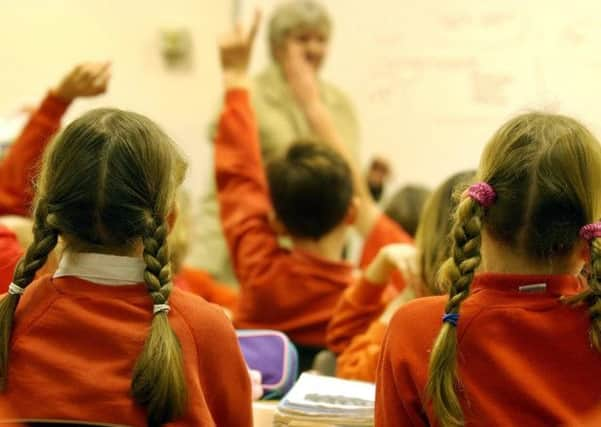Primary schools ‘crisis’ as thousands miss out on places


Dr Mary Bousted accused Education Secretary Michael Gove of relieving himself of his first key responsibility - to provide school places for the nation’s children.
Government reforms which have made it increasingly difficult for councils to open schools that are not free schools or academies have fuelled a crisis in places, the general secretary of the Association of Teachers and Lecturers (ATL) argued.
Advertisement
Hide AdAdvertisement
Hide AdHer comments came as hundreds of thousands of families across the country began learning which primary school their child will be attending from this September, in the first ever primary National Offer Day.
Early figures indicate that a child’s chances of getting their top choice depend heavily on where they live, with almost all getting their first preference in some places, and more than a third missing out in others.
Councils and schools have been facing an increasing squeeze on places, particularly for primary-age children in recent years, caused partly by a rising birth rate and the impact of immigration.
Dr Mary Bousted said: “We know that there is a growing crisis in primary school places and we know that the Government, for all the money they say they are throwing at the problem, they simply haven’t got the mechanism, they haven’t got the ability, to plan school provision where it’s needed. They have divested themselves of the levers to manage this situation.
Advertisement
Hide AdAdvertisement
Hide Ad“As soon as they prevented local authorities from building primary schools and they left it to the market, to free school providers and academy sponsors they’ve come across two main problems.
“The first is that there’s not been any national place planning. Local authorities say that despite the extra money, there isn’t enough money, and because of the land prices, it’s very difficult for free schools to get established.
“The biggest problems that free schools have is finding a place for the school.”
She added: “It’s no surprise that there’s a crisis in primary school places, because the Secretary of State, Michael Gove, has divested himself of his first key responsibility, which is to provide school places for children. He’s divested himself of his second key responsibility which is to put qualified teachers in front of those children.
Advertisement
Hide AdAdvertisement
Hide Ad“Whatever you think of the rest of his policies, those, to me, seem to be two quite big catastrophes for our nation’s children and young people.”
The Department for Education (DfE) said it has given councils more than £5 billion to establish new school places, with more than 260,000 created already.
A survey of local authorities, conducted by the Press Association, suggests that many councils have received more applications this year from parents for primary school places compared to last year.
At the same time, the data also indicates that in some areas, fewer pupils are getting their first choice of place, compared to 2013.
Advertisement
Hide AdAdvertisement
Hide AdAmong the responses were figures from Essex County Council, which showed that 86.72% of children in the area got their first-choice school this year, down from 87.11% last year, after the council received around 500 applications more than in 2013.
Dudley Council saw a sharp rise in the number of primary applications this year - 3,946, up from 3,762 in 2013. There was a two-percentage-point fall in children receiving their first choice school, from 90% to 88%.
Cambridgeshire had its highest ever number of applicants this year, with 7,052 children vying for a primary place, significantly up from 6,753 last year. Of those, 90.12% got their first preference.
In Rutland, around 97% of children got their first choice of primary, along with 96.7% in Doncaster and 96.97% in North East Lincolnshire.
Advertisement
Hide AdAdvertisement
Hide AdBut at the other end of the scale, almost two fifths missed out in the London borough of Kensington and Chelsea, where 61.6% got their top preference.
A DfE spokesman said: “We are increasing the number of good school places by tackling underperformance and opening new free schools and academies. We have also more than doubled to £5 billion the funding available to councils to create new school places, and are allowing good schools to expand without the restrictions and bureaucracy they faced in the past.
“This has already led to the creation of 260,000 new school places - all of which are in areas where there is a shortage of places, while seven out of 10 new places created under the free schools programme are in areas of basic need. Thanks to our reforms, the number of children in failing secondary schools has already fallen by a quarter of a million since 2010.”
• In Salford 86% of youngsters got their first-choice school this year, down from 86.6% last year. Some 133 more applications have been received this year compared with 2013.
Advertisement
Hide AdAdvertisement
Hide AdSome 158 children (5%) got none of their choices this year, compared to 162 last year (5.3%).
• In Durham 92% were offered their first choice, down from 94% last year when there were 81 fewer applicants.
Some 97.5% of youngsters got one of their top three choices of primary school places in 2014, down from 98.1% last year.
• There was good news for parents and children in Torbay as the number of first-choice offers rose from 88% in 2013 to 92.6% this year. This is despite the number of applicants rising from 1,310 to 1,335.
The percentage of youngsters who got one of their top three also rose from 95% last year to 98.6%.